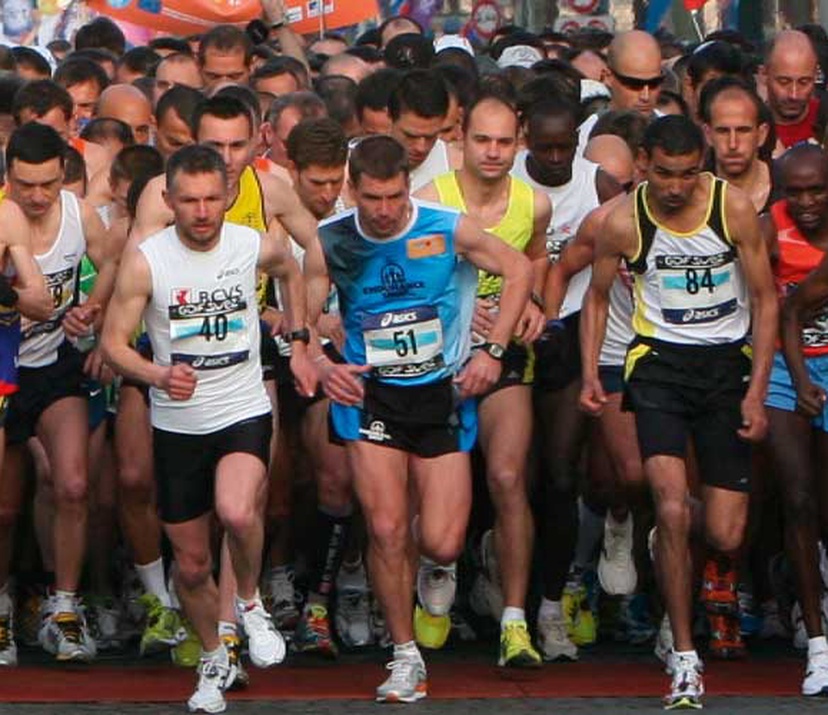It’s exhausting, painful and time-consuming. So why do people run marathons?
The drive of the marathon is – to the uninitiated – a mysterious force, and yet to others the desire to challenge oneself with a 42.195 km run is the most natural thing in the world. A closer look at those for whom the phrase ‘I’ll just slip into something more comfortable’ means their trainers and a headlamp, reveals a common characteristic: an iron determination. But why a marathon?
Easiest sport in the world
“Asking ‘why run a marathon?’ essentially asks the question ‘why run?’”, says Martin Smith (39) from England, who has run four half- and two full marathons. “Assuming you’re an average guy like me, you’d be looking to do a marathon in about four hours. Well, there are plenty of other sports that take that time. You could play a game of tennis for six hours – so why run? Personally, I have a family and a full-time job which involves a lot of travel. Running is the easiest sport to fit into a very busy lifestyle because I can do it anywhere, anytime and it’s free. Unlike tennis, golf or football, I don’t have to be a member of a club, and there’s relatively little risk of injury,” says the ex-rugby player.
“Then once you’re into it, the desire to set yourself a meaty goal starts creeping in.” Running seemingly does that. Whatever the initial motivators, the endorphins released during regular training apparently conspire to make you want to go farther, faster. Add to this the factors of looking and feeling great, and one begins to understand the attraction.
First the body, then the mind
A far-reaching ASICS survey of seven European nations recently revealed that, on the whole, “running starts with a wish to get fit and lose weight, but turns into a fun and stress-relieving pastime: ‘First the body, then the mind.’ In all seven countries, our runners agreed that fitness is their main reason for running, with 54% confirming it to be the most important reason to start and 63% affirming it as their reason to continue. The second most important reason to take up running is weight-loss, with 40% of all European runners claiming this as their motivation to start.”
It’s not an exclusively European ambition. “I started running about 10 years ago to lose weight,” says Michael Kingston (36) from South Africa, who weighed 105kg at the time. “Starting with 10km races, I progressed to 15km races to half marathons. I went on to do about 20 marathons and eventually an ultramarathon of 56km. Today I’m 72kg and what was initially a major challenge has now simply become a way of life. But then as now, pushing the boundaries, continuously improving and getting faster and testing one’s limits is extremely exhilarating,” he adds.
Pushing the limits
Indeed, whether running starts for practical or weight-loss reasons, it seems this personal testing of one’s limits is the absolute driving force among almost all marathon runners. Even those who run for charity concede that the will to reach this achievement for oneself comes first. Steve Ramus (35) has run for charity many times and is training for his first marathon, London 2010, a race that is renowned for its charity runners. “Even when running for a good cause, it still is about seeing if you can endure mental and physical punishment. But running for charity also helps you through those times when you ‘hit the wall’, as it’s a fantastic motivator.”
Beyond personal and charitable goals, however, Ramus also lists among his reasons “the release of tensions from the regular rat race of daily working life”. It’s a sentiment shared by Patrick Kessler, also 35, and a six-time marathon runner.
“When you’re training for a marathon, not only do you get a better sense of balance between life and work, but it’s also relaxing to get in touch with the elements and nature,” says the Munich-based company director, reflecting one of the foremost reasons for Germans to go running (doing sports outdoors), as found by the ASICS study. On the actual day of a marathon, however, the peace and quiet of nature is swapped for the buzz and blare of the crowds – a contrast that is often cited as a real adrenalin boost.
“My face may not say it, but you do notice the crowd and the support,” says Briton Sarah Blancke, who ran the Berlin marathon in 2005. “People who shout your name and words of encouragement definitely give you a lift. In fact, towards the final few kilometres, a pep-talk from a friend can mean the difference between hitting the wall and hitting your target.”
Marathons as training
So when the finish line is crossed, what then? “At first you think ‘I’m never doing this again’”, says Kessler, “And then just a few minutes after, when the incredible sense of satisfaction and pride sets in, you’re already planning the next challenge.” For some, that means going beyond marathons. Mats Söder (41) from Sweden, runs marathons not as a challenge, but as a means of training. A triathlete and Ironman competitor, he also runs ultramarathons, the longest of which was 100km.
“I did my first Ironman in 2000 and swam for 3.8 km, cycled 180 km and ran 42.195 km all in 11:59:15. But when my first baby was born, I had new family commitments and it was difficult to train. Running alone would suffice but a classic marathon no longer felt like a challenge. That’s why I turned to ultramarathons in 2003.”
Jeff Barnes (39) from the UK made the jump from marathons to triathlons, not out of boredom but because it combined three things he could do well. “As I only ever intended to compete in one Ironman, I thought I would go for the one that is considered the hardest in the world – Lanzarote – because I didn’t want to look back and think that I had taken the easy route!”
Perhaps it’s this self-punishing attitude that sets extreme sports people apart from the crowd, but Barnes insists: “I firmly believe that anybody of good health can complete a marathon or Ironman. I used to watch TV and think these people were superhuman; now I have completed one. It is all in the mind. Never give up.”
What are your marathon experiences like? Have you run one, several or are you currently in training? Perhaps you’ve run an ultramarathon or Ironman event. For yourself or charity. Whatever your long-distance running story, we’d love to know all about what motivates you.
Photo by Eric Bréchemier / CC BY 2.0



